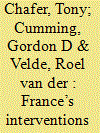| Srl | Item |
| 1 |
ID:
171707


|
|
|
|
|
| Summary/Abstract |
France’s interventions in Mali and the wider Sahel appear to mark a new departure in French military policy in terms of the approach to multilateralism adopted, the regionalisation of the response, and the levels of violence deployed. Yet how ‘new’ is this approach, when set against the historical backdrop of French military interventions in Africa? Should it be seen as a modified version – an adaptation – of the new type of multilateral engagement that emerged in the wake of the 1994 Rwandan genocide? Using a historical institutionalist lens, employing the notions of critical junctures, ‘layering’, and ‘drift’, this article briefly sets out the unilateral approach that marked French military policy in Africa prior to 1994 before going on to analyse the multilateral approach and associated path-dependent practices that emerged after the Rwandan genocide. Drawing on elite interviews in Europe, the US and Africa, the article shows that, while France’s engagement in the Sahel is characterised by an ostensibly novel multilateral approach, it does in fact combine new and old norms, ideas and practices.
|
|
|
|
|
|
|
|
|
|
|
|
|
|
|
|
| 2 |
ID:
137057


|
|
|
|
|
| Summary/Abstract |
Strategic culture has traditionally been used to detach non-western strategic behaviour from western ideas of rationality, but the concept is commonly used as a practical way of discussing apparent quirks of policy.1 The intelligence field nowadays recognizes the novelty of engaging wholeheartedly with strategic culture. Intelligence agencies have been ill-equipped to question their own assumptions, which trigger failed prediction of military capabilities and political intentions.2
|
|
|
|
|
|
|
|
|
|
|
|
|
|
|
|